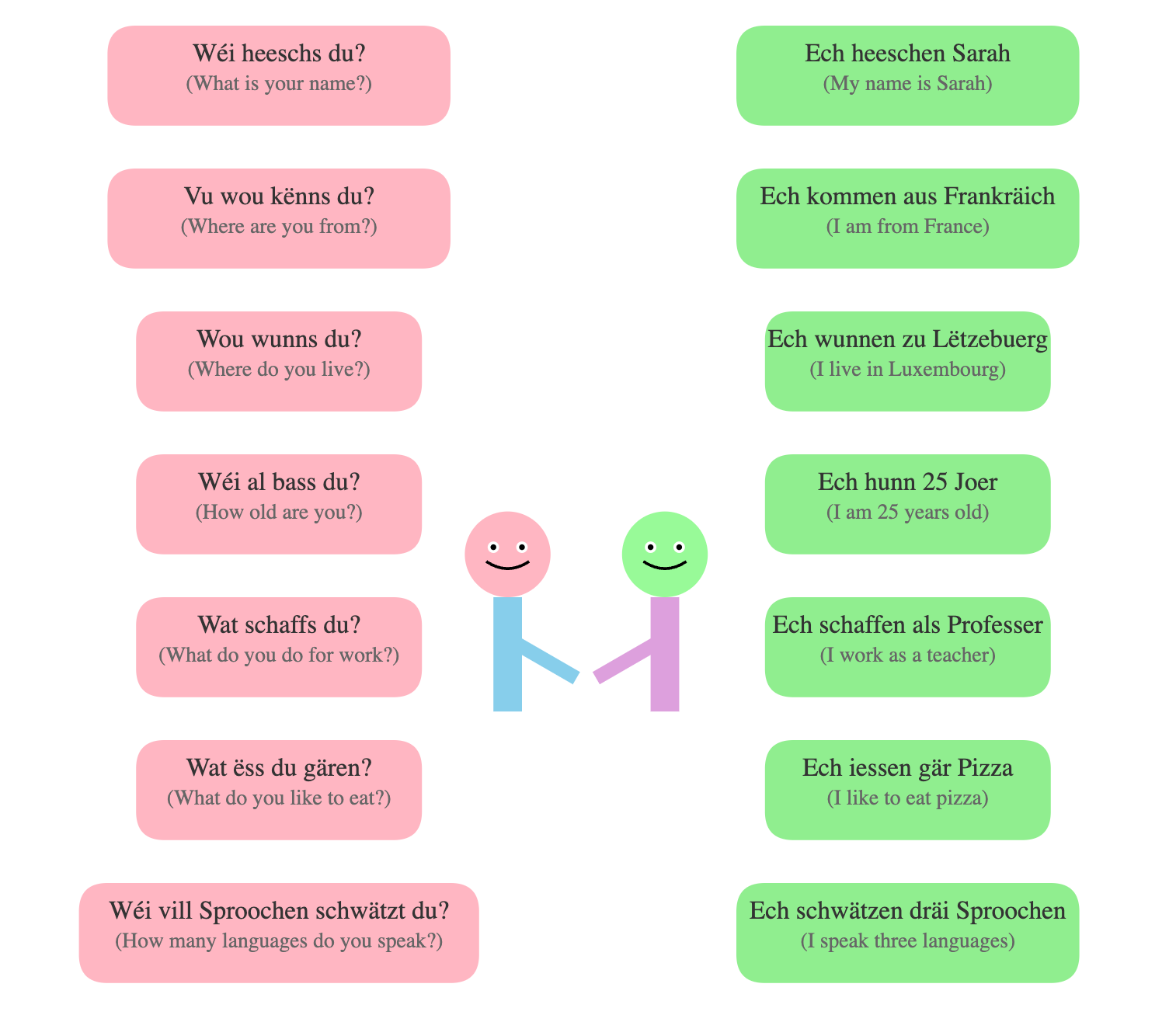Luxembourgish A1 : Class 1 📚
1. Countries, People and Languages
Introduction to Basic Conversations
Understanding basic conversations in Luxembourgish is essential for daily interactions. This lesson covers fundamental questions and responses for personal introductions.
Essential Questions and Their Structure
Asking Names
- Question: “Wéi heeschs du?” (What is your name?) 🔊
- Structure: ‘Wéi’ (how) + ‘heeschen’ (to be named) + ‘du’ (you)
Asking Origin
- Question: “Vu wou kënns du?” (Where are you from?)
- Structure: ‘Vu wou’ (from where) + ‘kommen’ (to come) + ‘du’ (you)
Asking About Residence
- Question: “Wou wunns du?” (Where do you live?)
- Structure: ‘Wou’ (where) + ‘wunnen’ (to live) + ‘du’ (you)
Asking Age
- Question: “Wéi al bass du?” (How old are you?)
- Structure: ‘Wéi’ (how) + ‘al’ (old) + ‘bass’ (are) + ‘du’ (you)
Asking About Work
- Question: “Wat schaffs du?” (What do you do for work?)
- Structure: ‘Wat’ (what) + ‘schaffen’ (to work) + ‘du’ (you)
Asking About Food Preferences
- Question: “Wat ëss du gären?” (What do you like to eat?)
- Structure: ‘Wat’ (what) + ‘iessen’ (to eat) + ‘gären’ (to like)
Asking About Languages
- Question: “Wéi vill Sproochen schwätzt du?” (How many languages do you speak?)
- Structure: ‘Wéi vill’ (how many) + ‘Sproochen’ (languages) + ‘schwätzen’ (to speak)
Common Response Patterns
Name Response
- “Ech heeschen [Name]” (My name is [Name])
- Example: “Ech heeschen Arman”
Origin Response
- “Ech kommen aus [Country]” (I am from [Country])
- Example: “Ech kommen aus Bangladesh”
Residence Response
- “Ech wunnen zu [City]” (I live in [City])
- Example: “Ech wunnen zu Differdange”
Age Response
- “Ech hunn [number] Joer” (I am [number] years old)
- Example: “Ech hunn véier an drësseg Joer”
Occupation Response
- “Ech schaffen als [profession]” (I work as [profession])
- Example: “Ech schaffen als Ingenieur”
Food Preference Response
- “Ech iessen gär [food]” (I like to eat [food])
- Example: “Ech iessen gär Pasta”
Language Response
- “Ech schwätzen [number] Sproochen” (I speak [number] languages)
- Example: “Ech schwätzen fënnef Sproochen”

Basic Numbers and Essential Vocabulary
Numbers 1-5
- zwou (2)
- dräi (3)
- véier (4)
- fënnef (5)
Common Words
- gären/gär (to like)
- net (not)
- keng (none)
- e bëssen (a bit)
- als (as)
- bei (at/with)
Family Status Terms
Relationship Vocabulary
- Jonggesell (Single)
- Bezéiung (In a relationship)
- Bestued (Married)
- Gescheet (Divorced)
Essential Grammar Rules
Location Prepositions
- Use “zu” for cities
- Use “an” for countries
Common Expressions
- “gär geschitt” = you’re welcome
- “Ech hunn dech gär” = I like/love you
Sentence Structure
- Place “net” (not) at the end of sentences
Pronunciation Guidelines
Key pronunciation rules:
- v → pronounce as “f”
- w → pronounce as “v”
- z → pronounce as “zzz”
Practice Tips
- Practice each question-response pair regularly
- Focus on proper pronunciation
- Learn numbers and basic vocabulary in context
- Use grammar rules in simple sentences first